Our friend Laurie is now two weeks out from her weight loss surgery. Before we learn about what the surgery was like, and how she’s doing now, we have to play some catch up! The last time we checked in with Laurie, she had made the decision to have weight loss surgery. Today, she walks us through the meetings and preparations required of her before the big day. (Catch up with Part 1, Part 2, Part 3, and Part 4.)
Part 5: Prep Work
First, I’d like to say a little something about people who think that WLS is some kind of quick-fix, or consider it “cheating,” or an easy/lazy way to lose weight. Honestly, I used to be one of those people. There have been a few people at my office who’ve had the procedure done in the last few years, and I can honestly say that my first reaction to finding out they had it done was “Pfff. Cheater.”
Yeah. So I’m here to set the record straight. Hear me, doubters, and hear me well: THERE IS NOTHING EASY ABOUT THIS. This is not cheating. This is the hardest thing I’ve ever done in my life, and every day continues to be a struggle. There is no “easy way” to go through weight loss surgery. If you’re looking for a “magic pill” solution that you think is going to take all the burden of ever having to diet off your shoulders, think again. You’d probably find a heroin addiction an easier option than this. This is a choice you make that will change literally every single thing about your lifestyle. Forever. Let me say it one more time: THERE IS NOTHING EASY ABOUT THIS.
That being said, let me tell you about the steps I took to get here. I went through Lahey Clinic in Burlington, MA, and these are the steps that they have determined to be the most effective – I understand some other hospitals have quite different rules and procedures, but I only went to Lahey, so I can only tell you about them.
First, I had to attend four two-hour meeting, every Monday night for a month. These were the mandatory “prep” classes, and I believe they may have been required by the insurance companies. These were group classes, held at the hospital, that basically walked us through some helpful tips to prepare us for how we would be eating post-surgery. I took a lot of good from these meetings – we talked a lot about why we were doing what we were doing, and addressed a lot of common reasons for overeating (psychological, physical, emotional, etc.). It’s funny – I’ve thought about all of those things most of my life, but sitting down with a group and hearing the same stories and problems I’ve experienced coming from 15 other people…it was refreshing and comforting. It was also extremely good for me to hear some of my own reasons for overeating spoken out loud and thrown up onto a white board. Yes, I’ve always known about my habit for justifying “breaking” a diet or eating too much, but to admit that to a group of people – and have them all nod their understanding – was good therapy.
So I enjoyed the classes – I grumbled about them at first (they were held from 5PM to 7PM in Burlington – I wouldn’t get home until almost 8:00) but I was glad they held them, and glad I went. It also made me feel like the surgical weight loss team at the hospital genuinely cared about us, and was really pulling for our success. Nice feeling.
After that was the testing. Most of what I had to do before surgery was to make sure I was strong and healthy for the surgery itself – they wanted to minimize the risk of anything bad happening while I was under, and as much as the things they made me go through were kind of a pain in the rump, I appreciated the thought. After all, what was I going to say? Don’t make me safer?
So I had an upper-GI test to make sure my throat and breathing parts would be clear for the breathing tube (they were fine), and EKG to make sure my heart was strong (it is), and a sleep apnea test to make sure I didn’t have sleep apnea (I do). The last one was the worst – I didn’t want the apnea test in the first place, because the last thing I needed was to sleep with a friggin’ Darth Vader mask every night. But I took the test, failed it MISERABLY (I woke up 78 times every HOUR, as it turns out) and ended up with a full mouth/nose mask. I had to wear it every night until surgery, which turned out to be about four weeks, and the cardiologist I met with said that I would most likely have to wear it for the rest of my life. He suspects I’ve had sleep apnea my whole life, but just never knew it (he said that is extremely common). So ok, I wore the mask every night like a trooper, and I begrudgingly had to admit that I did feel the difference, almost immediately. Not surprising if you consider that I probably have never slept through the night my entire life. 🙂
Next time, Laurie talks about the amount of weight she was asked to lose prior to surgery, and the steps she took to get ready for the big day.
If you have a story you’d like to share, please contact me at bigfitdeal@gmail.com.

